Signs of hair loss
Hair loss can appear in many different ways, depending on what's causing it. You may experience gradual thinning on the top of your head, circular or patchy bald spots or sudden loss of hair.
Signs of Hereditary/Genetic Hair Loss
Not sure if you need hereditary hair loss treatment? Look to these early signs:

A receding hair line or widow’s peak
Hereditary hair loss typically begins with the receding of the hairline and the thinning of the hair. The best way to tell if you hair has receded is to find a picture of yourself from a year ago and make a comparison.

More hair on your pillow
We lose on average 30 to 150 hairs per day. If you see more than your usual amount of hair, this could be a sign of hereditary hair loss
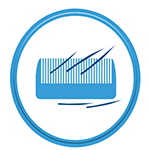
More hair in your comb or brush
Having a few hairs in your comb or brush is normal. If you start to see more than usual this could be a sign of hereditary hair loss.

More hair in the shower drain
Having a large amount of hair in the drain after washing your hair is a sign that your losing more hair than normal.
The Progression of Hereditary/Genetic Hair Loss
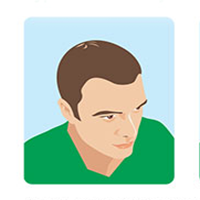
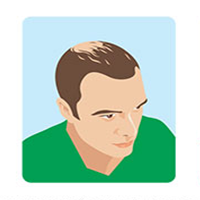
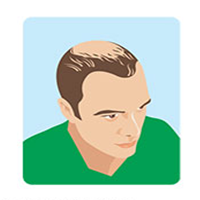
In men, hereditary hair loss also known as male pattern hair loss, typically starts with the receding of the hairline at the temples of the head creating a horseshoe shape, followed by the thinning of hair on the crown.
The Hair Growth Cycle and How Hair Loss Happens
The hair growth cycle has three phases: the growth, transitional and resting phase. Below is more information about what happens in each phase of the hair growth cycle.
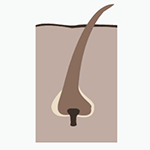
Phase 1: Growth (or anagen)
For every hair on your head, the cycle begins with the growth phase, which lasts from 3 to 5 years. The hair grows at 1cm a month and usually about 85% of your hair is in the anagen phase.

Phase 2: Transitional (or catagen)
Eventually, the cells at the base of the hair stop multiplying. As a result, the hair stops growing before the resting phase begins. This catagen phase lasts about 2 to 3 weeks.

Phase 3: Resting (or telogen)
After the transitional phase, the hair follicles enter a 3-month resting phase. At the end of this, the hair is shed, and new hair replaces it. The growing cycle then starts again.
If you are experiencing hereditary hair loss, you may still notice your hair growing. However, your follicles will continue to shrink, producing finer, shorter, and harder-to-see hair with each cycle until they are no longer able to make new hair
FACTS ABOUT THINNING HAIR IN MEN

The average scalp is covered with 100,000 hair follicles
Most people lose between 50-100 hairs a day
Male pattern hair loss follows two predictable routes. A receding hair line and thinning at the crown.
The earlier you treat your hereditary hair loss with REGAINE® the better your chances of seeing results are.
REGAINE® contains minoxidil which is scientifically proven to help stop and even reverse hereditary hair loss.
